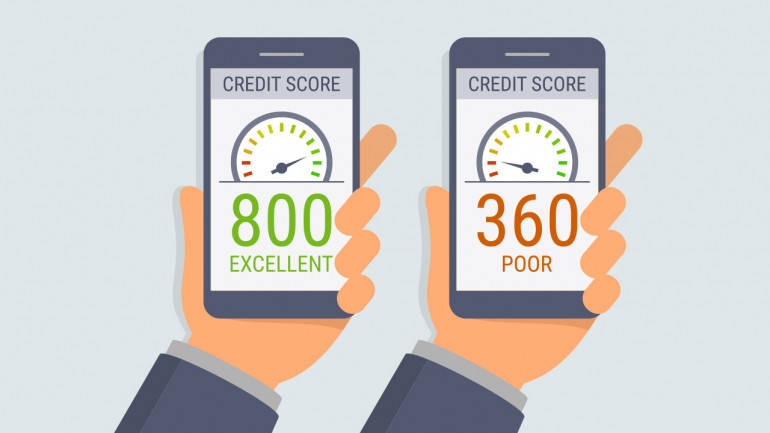If you’re an anti-credit score or just plain afraid of credit, you might want to rethink that stance. You’re hurting yourself financially in the long run.
There are three minimum requirements to generate a FICO score. First (and my personal favorite), you need to have a credit file that doesn’t suggest you’re deceased. If you’re able to read this, you’re alive and kicking, so this requirement is a breeze, right?
Second, you must have at least one account open for six months or more. And third, you need to have at least one account that’s been reported to the credit bureaus.
If you have zero or limited credit, you can satisfy the “at least one account” requirement with something as simple as a secured credit card or maybe a credit-building loan from your bank or credit union.
Choosing to avoid credit puts you in a compromised position. Here are five reasons why having a credit score helps you become independent, a little bit richer and even more employable:
- Renting an apartment
- Buying a home
- Refinancing student loans
- Getting a credit card
- Applying for a job
When you want to rent an apartment, the landlord or manager usually checks your credit report. Even without requesting your credit score, a landlord can tell from your report if you’re likely to be a tenant who pays on time.
If you don’t have a credit score, then your credit report probably looks like a ghost town. This situation tends to spook landlords.
There are ways to get around this, but it costs you. You can offer to pay a few months’ rent as a security deposit to show your good faith. If you’d had a good credit score, you’d probably get by with one month’s rent as a deposit.
Now, you also need utilities. Guess what? Utility companies want to look at your credit report, too. You’ll be asked to pay a deposit for utilities if they think you’re a credit risk. You might be able to get by without a deposit if you can find someone who will agree to pay the utility bill in the event that you don’t pay. Unless your mom or dad is willing, I wouldn’t count on using this strategy.
If you don’t have a FICO score, it could be difficult to find a mortgage lender. And since it takes time to earn an excellent credit score, the longer you wait to start working on it, the more interest you’re going to have to pay on a mortgage.
I checked out the Loan Savings Calculator on myFICO.com. My credit score is high, so I clicked on the 760-850 range. On a $300,000, 30-year, fixed-rate mortgage, my monthly payment for interest and principal would be $1,230. My annual percentage rate would be 2.784%, and the interest I’d pay over 30 years would be $142,848.
Now, let’s look at the other end of the credit spectrum. The lowest range offered on the calculator is 620-639. With the same loan, I’d pay $1,498 per month. My APR is now 4.373%, and the interest I’d pay over 30 years is a whopping $239,101.
That’s a difference in interest of $96,253. You can pay all or at least part of your child’s college education with that. Also, notice that your total interest over the life of the mortgage is almost 80% of your original $300,000 loan. Keep in mind, too, that right now, rates are especially low, so that’s why the difference isn’t more extreme.
Bottom line? Unless you have $300,000 sitting around somewhere, you need a great credit score to make buying a home affordable.
According to the Institute for College Access & Success, the average student loan debt at graduation in 2018 was $29,200, which was a 2% increase over the average debt in 2017.
If you’re already making payments on your student loans, here’s your chance to build a credit score. Once you develop a good credit score, you can consolidate your student loans and maybe get a better interest rate.
So, over the long haul, you’d be paying less interest on the loans. Don’t underestimate the power of a good credit score when you have student loan debt. It can help you create more room in your budget for savings.
The Coronavirus Aid, Relief and Economic Security Act, signed into law in March, offered deferred payments on student loans. If you took advantage of this law, be aware that the suspension of payments ends on Sept. 30.
If you need more time to get into a position to make loan payments again, contact your lender to discuss options. This is still an opportunity to build credit, so take action to keep from defaulting on your loan.
If you’re a supporter of the anti-credit card crowd, I understand where you’re coming from. You worry about debt. I’m anti-credit card debt all the way.
But as long as you can use a credit card responsibly, you won’t get into debt. The key is keeping low balances and paying your bills in full by the due date.
A credit card is nice to have for emergencies or for renting a car. And using a credit card is the safest way to shop online. Sure, you can use your debit card online, but why would you want to do that? If your account number gets stolen, your account can be drained before you realize what’s happened.
And yes, you might get most or maybe even all of your money back. But in the meantime, how will you pay your bills while you wait for the bank to sort out this mess?
With a debit card, your losses range from zero to $500, depending on how quickly you report it. Under the Fair Credit Billing Act, if an unauthorized person uses your credit card, your maximum liability is $50, but most major issuers offer zero liability.
Here are some options for first-time credit card holders:
Student credit card. If you’re still enrolled in college, you might qualify for a student credit card. Not everyone is mature enough during the college years to handle this well. So, make sure you’re ready to be self-disciplined before taking the plunge.
Secured credit card. A secured credit card works just like an unsecured card. The difference is that you put a deposit in a bank account to “secure” the card. You then get a credit card, and you use that to make purchases. Pay your bill promptly, and since the issuer will report your payment history to the bureaus, you can develop a credit score.
Authorized user. If you’re ready to build credit but can’t qualify for a secured card (this can happen), then ask a parent or close relative who has great credit if you can be an authorized user on one of their credit card accounts.
To be clear, a potential employer will not be looking at your credit score. But an employer might look at your credit report. And as already mentioned, if you don’t have a credit score, you’ll have a pretty bare credit report.
A desolate-looking credit report could make you appear a little suspect to an employer. When an employer sees that you can use credit responsibly, it sends a message that you’ll be responsible at work, too.
Is this fair? No, not really. But this is the reality you have to deal with.
This is less of an issue for someone who has just graduated and only begun to build credit. But if you’re well into your 20s and 30s, then you may need more on your credit report than your student loans if you want to impress a prospective employer.
Good Credit Protects You During a Pandemic
Don’t ever have the mindset that a credit card is your new emergency fund. You need an emergency fund because life is unpredictable even during normal times. But during a pandemic, when jobs and savings accounts are shaky, a good credit score is a safety net.
Let’s say you lost your job four months ago and you just got rehired. You had enough in your rainy-day fund to cover expenses for three months, so you needed help to make it through the past 30 days.
In a situation like this, a good credit score can help you stay afloat until your income is back to its pre-pandemic level. For example, good credit gives you access to cards with a 0% introductory APR on purchases, which offers you a chance to pay off your balance over the course of 12 to 21 months without paying interest. If you prefer to avoid credit cards, a good credit history will help you get a personal loan at a low interest rate.
Is using credit ideal? Of course not! But having a way to plug a hole in a sinking ship while you’re waiting for the storm to pass gives you time to properly fix the leak and get back on course.












